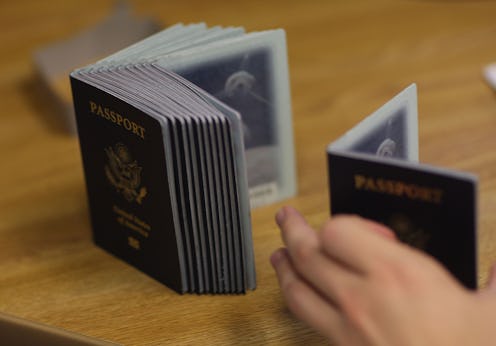News
You Might Need A Passport To Fly — Even Domestic
Thinking of a weekend trip to Hawaii? California? Even somewhere as mundane as Arkansas or Kansas? You might need to apply for a passport if your flight — even domestic — is next year. If your ID is from a number of states, including California, Illinois, or New Jersey, then you might be prohibited from boarding a plane starting May 10, 2016 unless you have another federally-approved form of identification. The Department of Homeland Security has decided to move ahead with the implementation of the REAL ID Act, which places new requirements on states issuing IDs like drivers licenses.
The law, passed in 2005, was a recommendation of the 9/11 Commission. Its goal was to standardize more stringent requirements to prove one's identity before getting an ID. The idea was to prevent identity theft, combat fraud, and keep criminals and terrorists from getting a drivers license. Some states, though, haven't gone along with the plan. Due to concerns about privacy and increased costs, many have delayed or refused compliance with the law. The federal government can't make the states do so, but it can force adherence in other ways. The New York Times reported in October that the federal government began requiring visitors to military bases, nuclear plants, and other federal facilities to provide an ID from a compliant state.
If you have a trip planned for January, then don't worry. When Homeland Security and the TSA begin enforcing the law in airports, travelers will have 120 days to get another form of identification. New passports cost $135, and passport cards that can be used for land crossings with Canada, Mexico, and limited boat travel in the Caribbean are $55 for adults. Plan ahead, though; it can take up to six weeks to get your passport, and expedited service costs an additional $60.
Not all states will be affected by next year's changes. Some 22 states and Washington, D.C. already comply with the law. Another 18 states have been granted exemptions that last until October 2016. New Hampshire also has an exemption, but only until June. Again, from the end of the extension, travelers would get another 120 days to get another ID.
That leaves nine states whose residents could face a tough time at security checkpoints in the short term. Alaska, California, New Jersey, and South Carolina have all applied for further extensions, but as of Tuesday, their waivers end Jan. 10. The Department of Homeland Security is still reviewing the requests.
Illinois, Minnesota, Missouri, New Mexico, and Washington have no extension waivers under review, and would be at risk the moment Homeland Security makes the change. The DHS website says the states will be "subject to enforcement" beginning Jan. 10. If Homeland Security begins enforcement at airports that day, travelers would have until May 10 — 120 days later — to get their passports. Enhanced drivers licenses from Minnesota are not affected.
I hate to be the bearer of more bad news, but even if you have an ID from a compliant state, you may not be out of the woods in the long run. As of now (it's already been pushed back once), starting in October 2020, you'll need a compliant ID from a compliant state to board a plane and enter federal facilities. These IDs have a special design — usually with a gold star — to designate that they comply. Make sure to ask for one when you renew your license; in some states, they're optional.
If you're from one of the nine affected states, you might want to apply for the passport card now — just to be prepared. There would be nothing worse than trying to take a vacation and TSA not letting you board the plane. The pat down is bad enough.
